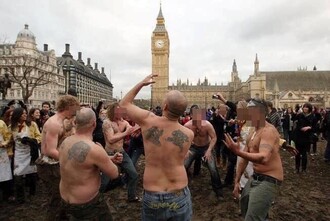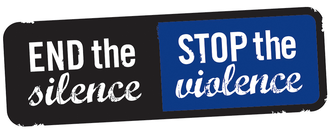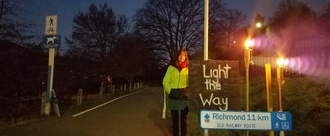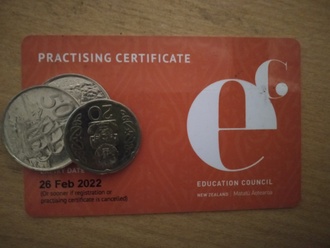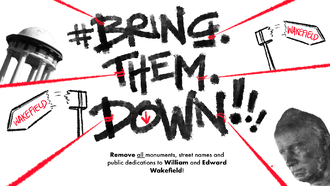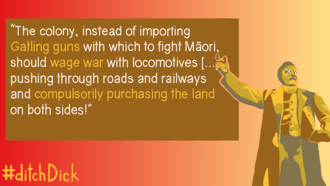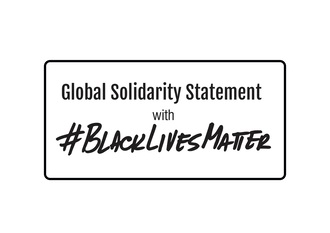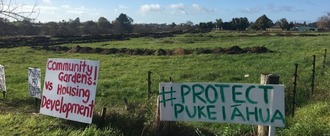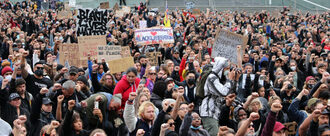-
Remove 'Waitangi Day' from the Waitangi Day Circle Line Pub Crawl event name & cancel the drunk HakaThis is important because the inclusion of Waitangi Day in the pub crawl title enables and perpetuates the dishonouring of Te Tiriti o Waitangi and is culturally insensitive. It also provides (and has done so on many accounts) an opportunity for intoxicated pub-crawl-goers to try to perform the Haka while wasted. The Pub Crawl (that has been going for 37 years) encourages New Zealanders in the UK to drink a lot of alcohol and 'celebrate' Waitangi Day by dressing up as 'kiwi icons' (eg. beer brands and marmite) and hop from one British Pub to another. As well as this, photographs have long-ago emerged of people trying to imitate traditional Māori Korowai, Tipare and drawn-on Moko Kauae poking out tongues and attempting pukana. Does this enhance mana? Does this contribute to British & European people seeing Haka performed incorrectly in London and therefore enables more terrible 'performances' of Ka Mate and Tika Tonu? Does the use of Waitangi Day by a non-Māori lead organisation and community respect the pain, loss and struggle Māori people have endured and still fight for when it comes to Te Tiriti and the reclamation of land, reo and culture? Related links: The Spinoff Article - There's something off about the Waitangi Day Pub Crawl by Madeleine Chapman https://thespinoff.co.nz/atea/06-02-2019/theres-something-off-about-the-london-waitangi-day-pub-crawl/ NZ Herald Article - Pleas for drunk Kiwis to abstain from haka during London Waitangi Day Pub Crawl by Michael Neilson https://www.nzherald.co.nz/nz/news/article.cfm?c_id=1&objectid=12305813 Te Ao Tapatahi Interview with Creator of Petition - Ashley Clark https://www.facebook.com/watch/?v=2957233182201501,424 of 2,000 SignaturesCreated by Ashley Clark
-
End Teen ViolenceOur aim is to raise awareness, educate children in schools and talk about this issue so that we can provide help for those who have experienced or are going through violence, and hopefully prevent it too. We believe that this issue needs to be talked and normalised in conversations at schools because this issue is prevalent, and is hurting our youth. Violence is rooted from several factors, such as systematic poverty, family issues, experiencing violence at home and many more. Research shows that teen violence is more prevalent in Maori and Pasifika youth. Although the numbers have decreased, the seriousness of the offences still remain high. "...the reduction in offending rates for European and other ethnicities far outstripped young Pasifika and Maori, who dropped by 61% and 59%...Youth offending in the European/other category fell by 74%". [https://www.newshub.co.nz/home/new-zealand/2018/04/youth-crime-rates-decline.html] For many of us it affects us personally where families have lost their children to teen violence190 of 200 SignaturesCreated by End Teen Violence
-
Light the Way 2020 (Railway Reserve, Nelson)We believe that this thoroughfare is a vital part of the Nelson commuter network for cyclists, pedestrians and skateboarders, as well as a very popular local route for Nelson south residents, dog walkers and runners. Long distance cyclists typically use this route also. By lighting the way we hope this route will become safer and more appealing for movement outside of daylight hours, particularly in the winter, giving us more choice to move around our city without motor vehicles, and to recreate more safely in our local neighbourhood.212 of 300 SignaturesCreated by Ange Palmer
-
The Teaching Council must be reviewedThe purpose of the Teaching Council is to ensure safe and high-quality leadership, teaching and learning for children and young people in early childhood, primary and senior secondary schooling in English medium and Maori medium settings through raising the status of the profession. Over 30,000 people called on the Teaching Council to review their decision to raise registration fees.[1]. Teachers who were unhappy with the decision and the communication from the Teaching Council include people who teach at early childhood, primary and secondary and include part-time and assistant teachers. The petition was delivered to Lesley Hoskin and the Teaching Council on 10 June 2020. A resolution has not been achieved so we now seek action with the Minister of Education. We believe the Teaching Council does not represent teachers' best interests. Teachers have lost trust and confidence (as highlighted by the PPTA 95% vote of no confidence).[2] The Teaching Council's duties need to be independently examined to determine whether they support and work for teachers. The review should include a review of its expenses and the level of registration fees charged to teachers. This is why we're calling on the Minister of Education Chris Hipkins to launch a review into the Teaching Council on behalf of the teaching sector. Sign now to join the call. This petition is led by teachers. References: 1. Say no to doubling teacher registration fees, OurActionStation https://our.actionstation.org.nz/petitions/fight-against-doubling-to-teacher-registration-fees 2. Teachers vote no confidence in Teaching Council over fee increase, RNZ, June 2020 https://www.rnz.co.nz/news/national/418585/teachers-vote-no-confidence-in-teaching-council-over-fee-increase11,077 of 15,000 SignaturesCreated by Anna Hamilton
-
Please speak up on Israel's Annexation of Palestinian LandNew Zealand has been silent for six months as Israeli Prime Minister Netanyahu has been preparing a blatant breach of international law in his proposed annexation of vast swathes of Palestinian land in the Occupied Palestinian Territories. The previous National-led government co-sponsored United Nations Security Council resolution 2334 in December 2016 which said Israel’s settlement building on occupied Palestinian land constituted a "flagrant violation" of international law and had "no legal validity". It demanded Israel stop such activity and fulfil its obligations under the Fourth Geneva Convention. However, this Labour-led coalition government has been deafeningly silent while Israel not only continues buildings illegal settlements but now intends to steal the land itself. The issues of Annexation are covered in this excellent Fact Sheet from APAN in Australia - https://apanaustralia.files.wordpress.com/2020/04/annexation.pdf People around the world, including in Israel, are speaking up while New Zealand stays silent: * Israel - Huge Jewish-Arab Rally in Tel Aviv Decries Netanyahu's Plan to Annex 1/3 of West Bank - https://www.commondreams.org/views/2020/06/07/palestinian-lives-matter-huge-jewish-arab-rally-tel-aviv-decries-netanyahus-plan * Israel - It might not take much effort to derail Netanyahu’s annexation plan - https://www.middleeastmonitor.com/20200609-it-might-not-take-much-effort-to-derail-netanyahus-annexation-plan/ * Britain - Israel's West Bank plans condemned by leading British Jewish figures - https://www.theguardian.com/world/2020/jun/05/israel-west-bank-annexation-plans-condemned-leading-british-jews * America - As Netanyahu moves closer to annexation, pressure builds in DC to stop him - https://www.timesofisrael.com/as-netanyahu-moves-closer-to-annexation-pressure-builds-in-dc-to-stop-him/ * Global - 100 law experts warn against Israel’s annexation of West Bank - https://english.alresalah.ps/new/post.php?id=6810237 of 300 SignaturesCreated by Neil Scott

-
#BringThemDown - William and Edward Wakefield monuments, street names and public dedications.Edward and William Wakefield were imprisoned for three years in England for abducting a 15 year-old girl. Edward established and William led the New Zealand Company which swindled land out of Māori hands and promoted the systematic colonisation of Aotearoa. Currently, there is a bronze bust of Edward Wakefield at Mt Victoria, a concrete structure at the Basin Reserve dedicated to William Wakefield, Wakefield Street, and other public dedications. We must stop elevating colonial narratives like these because in doing so, we condone them. We must elevate the kōrero of tangata whenua. These must be removed. Further reading: [1] https://i.stuff.co.nz/national/politics/opinion/121823266/racism-monuments-and-ethical-remembering [2] https://nzhistory.govt.nz/people/edward-wakefield [3] https://nzhistory.govt.nz/people/william-wakefield [4] https://www.stuff.co.nz/national/121812546/two-monuments-to-sexual-predators-and-colonisers-could-be-scrapped-in-wellington [5] https://www.stuff.co.nz/dominion-post/news/wellington/111973644/wellington-places-named-after-controversial-historical-figures-could-be-renamed [6] https://www.tvnz.co.nz/one-news/new-zealand/new-zealands-colonial-statues-engulfed-in-controversy?fbclid=IwAR2mPikxToRhr2orN89s5bwCNeoGWfPHRAj9m-ZoK8q4C0O_dDD01754OJ0 [7] https://www.rnz.co.nz/news/national/418937/controversy-over-nz-colonial-statues-long-standing [8] https://youtu.be/iwclRJ2VC6A1,800 of 2,000 SignaturesCreated by Te Matahiapo Safari Hynes

-
Remove the Statue of Dick Seddon from Parliament Lawn“A nation reveals itself not only by the men it produces but also by the men it honours, the men it remembers.” - John F. Kennedy #DitchDick is a campaign petitioning the New Zealand government to remove and replace the statute of Richard “King Dick” Seddon which currently stands in front of the New Zealand Parliament Buildings. Dick Seddon was an established and notorious autocrat, imperialist and racist, and his beliefs are totally incompatible with the values of Aotearoa New Zealand as a just and modern nation. Seddon actively opposed the enfranchisement of women, supported racist policy against Chinese people, supported widespread confiscations and coercive purchase of Māori land and attempted to invade and annex the Pacific nations of Fiji, Sāmoa and the Cook Islands, succeeding in the latter. We call upon the government to relegate Richard Seddon to the history books and no longer honour him with pride of place in front of the highest legislative body in the nation. Seddon’s abhorrent words and deeds have no place in modern New Zealand, and there are many other great Kiwis who deserve the coveted place on Parliament lawn far more than he. References and further reading: -Grimshaw, Patricia. Women's Suffrage in New Zealand. Auckland University Press/Oxford University Press, 1972. xx, 151 pp. -Scott, Dick (1975). Ask That Mountain: The Story of Parihaka. Heinemann. -Burdon, Randal Mathews (1966)."Seddon, Richard John". In McLintock, A.H. (ed.). An Encyclopaedia of New Zealand.453 of 500 SignaturesCreated by Nikau Wi Neera

-
Global Statement of Solidarity with #BlackLivesMatterBlack people around the world have been subject to colonial rule, the atrocities of the transatlantic slave trade, and the effects of white supremacy culture. Capitalism and the immense wealth of the global north was built on stolen labor, ongoing colonisation, and violent dispossession at the hand of white supremacy against people of African descent and Indigenous peoples. The condition of Black and Indigenous peoples throughout the world today must be placed in its proper historical context. The recent grassroots uprisings across the globe are powerful and demonstrate how fed up Black communities are with systemic oppression and racism. These protests demand not just an end to Black suffering and death but a commitment to help Black people live and thrive, to shift from a world centered on white supremacy and violence to one grounded in equity and justice. This moment demands that each of us—especially those of us who are not Black or indigenous—act with great urgency in defence of Black lives, to support the work of ending police brutality and white supremacy, and to bring forth a world in which Black people are truly free and liberated. While the Black experience and fight for justice around the world are as varied and diverse as Black people themselves, we stand in solidarity with the Movement for Black Lives and call on elected leaders around the globe to end the war against Black people.5,182 of 6,000 SignaturesCreated by Team ActionStation

-
#protectpukeiāhuaUPDATE: Our petition was formally read and tabled in Parliament on 28th July 2020. Recently, the Māori Affairs Committee invited us to make a written submission on our petition by early February. We have several projects kicking off soon, including a neighbourhood parakore initiative, school and community tours, and master planning for Pukeiāhua. *** Pukeiāhua Pā in Ngāruawāhia is a historic Māori settlement with great cultural, archaeological and educational value to hapū and the local community. Over three hundred years ago, during a feast held at Pukeiāhua Pā, Ngāti Tamainupō chief Ngaere spoke these words: "Wāhia ngā rua - Break open the food pits." This is the story of how Ngāruawāhia was named, a narrative carried by each and every resident and business who call this place 'home'. According to hapū research, over 140 borrow pits or 'rua' were part of the extensive gardens making up Pukeiāhua Pā. Sadly, most of these 'rua' have been destroyed due to development, and only seven remain today. These 'rua' are located on the proposed site for a new subdivision. An Archaeological Authority for the proposed subdivision was approved on 25th March 2020, a day before lockdown. Due to an "administrative" error, Ngāti Tamainupō were not notified properly as mana whenua, nor provided with an opportunity to appeal the Authority. Excavation began on-site on 6th May 2020. The next day, concerned hapū and community members turned up in protest to stop further digging. The developer has agreed to stop all works onsite for now, however we need local and central government to come to the table with a solution that will protect this whenua for the whole community. Instead of high-cost housing, we envisage a greenspace that sustains the narrative of Ngāruawāhia as a cultural, heritage and ecotourism location; a place for community gardens and edible forests; and a space for whānau and tamariki to learn, relax and play together. We believe this is a dream worth fighting for, a dream worth uniting for. Sign the petition to ask the Government and Waikato District Council to protect this whenua for good and return it to mana whenua and the community as a reserve. https://www.youtube.com/watch?v=9mrEmuxSUxo&feature=emb_logo4,572 of 5,000 SignaturesCreated by Kimai Huirama
-
5-Point Grade Bump for VUW StudentsThe impacts of COVID-19 on student health, wellbeing and academic success have been wide and varied. Many of us have lost our jobs, had our lives drastically changed, or had our mental health severely impacted as a result of greater financial uncertainty and academic pressure. We have been expected to work and thrive in conditions that are not conducive to academic success. We believe for the sake of student wellbeing, equity, and compassion, the University needs to listen to the voice of the student body and implement these changes for Trimester 1. We ask the University to consider the impact on equity between Victoria students and those of other Universities. A lack of parity between ourselves and Universities such as Otago and Auckland will impact our graduates who are seeking employment in a post-COVID world. In addition, graduates seeking to pursue further education at another University will also struggle, and their chances of receiving financial aid will suffer. VUWSA believes that a grade bump would ensure that VUW students are on equal footing with other universities who have adopted this measure. If this grade increase, alongside other equity measures – such as reduction of course workload, and 2-week extensions on assignments – are comprehensively implemented, VUW students can be assured that their academic success, as well as their health and wellbeing, are at the forefront of the university’s mind. VUWSA, alongside other student representatives, have been advocating through our internal avenues for these measures to be put in place. In many of these meetings we have been part of a small minority of students, often being ignored or shut down regarding this issue. The recent uproar of student voices around this issue have demonstrated the need for greater academic support and communication for those studying at Victoria University of Wellington. For the sake of our wellbeing, equity, and compassion, we call on the University to listen to, and act upon, the concerns of their student body. For more information check out VUWSA’s socials https://facebook/vuwsa or email [email protected].7,355 of 8,000 SignaturesCreated by VUWSA Campaigns
-
People bereaved by suicide within Aotearoa New Zealand need better supportWe are two students currently in the fourth year of our Social Services Degree, and both of us have lived experience of losing a loved one by suicide. We believe the lack of support for those bereaved by suicide is a social justice issue that needs to be addressed. Caro - "In 2017 I lost my brother Declan Peachey to suicide he was 35 and a father of three children. There was no support. My family and I had to struggle alone. Although the pain will never fully be erased, It was only because I found help through counselling (initiated by me), that I myself have started to heal and move on. Not everyone can afford to receive counseling, and not everyone has the means to find support for themselves". "Killarney- In 2012 I experienced losing someone to suicide for the first time. I lost two friends in high school, then in 2017 I lost one of my best friends and then at the beginning of this year we lost a family member. During this time none of us received any support nor did the families involved. The grief and healing process was something that we had to do alone. Access to supports can be expensive and reaching out can be difficult". Estimates made in the past tell us that for every person who completes suicide, six people within their close circle are impacted or affected greatly. More current literature shows that this is a severe underestimate and the number could be around 18 people affected (Hanschmidt F, Lehnig F, Riedel-Heller SG, Kersting A, 2016). Those Bereaved by Suicide, have much in common with those who lose a loved one to any other death. They suffer the usual symptoms of grief, such as cognitive, emotional and somatic difficulties however, they are also more likely to experience “complicated grief”. Complicated grief entails prolonged grieving, with characteristics such as a yearning for the loved one, pain that stays fresh, avoidance of reminders about their loved one’s passing, anxiety, depression, panic disorder, Post Traumatic Stress Disorder (PTSD), they may have difficulty re-establishing a meaningful life and finally, may contemplate or complete suicide themselves. Not everyone bereaved by suicide might suffer from complicated grief, however, stigmatisation and feelings of guilt, or poor family relations, for example, may exacerbate the chances of them doing so. (Tal Young, I., Iglewicz, A., Glorioso, D., Lanouette, N., Seay, K., Ilapakurti, M., & Zisook, S. 2012; Hanschmidt F, Lehnig F, Riedel-Heller SG, Kersting A. 2016). We believe that the creation of a nationwide support service particularly targeted towards people bereaved by suicide would help to alleviate if not eliminate complicated grief symptoms, prevent possible further suicides, and remove the stigmatisation and marginalisation that those who are bereaved by suicide may face. We believe this goal is achievable because, the Suicide Prevention Office is already in service, and this would be a natural progression and direction for it to take alongside suicide prevention. It would be an opportunity for postvention as well as prevention. References; Ministry of Health. 2019. Every Life Matters - He Tapu te Oranga o ia Tangata: Suicide Prevention Strategy 2019–2029 and Suicide Prevention Action Plan 2019–2024 for Aotearoa New Zealand. Wellington: Ministry of Health. Hanschmidt F, Lehnig F, Riedel-Heller SG, Kersting A (2016) The Stigma of Suicide Survivorship and Related Consequences—A Systematic Review. PLoS ONE 11(9): e0162688. doi:10.1371/journal.pone.0162688 https://journals.plos.org/plosone/article/file?type=printable&id=10.1371/journal.pone.0162688 Beehive.govt.nz (2019) Suicide Prevention Office gets down to work 2019 Press Release RT HON JACINDA ARDERN HON DR DAVID CLARK https://www.beehive.govt.nz/release/suicide-prevention-office-gets-down-work Beehive.govt.nz (2019) Suicide Prevention Office to drive action to save lives:10 SEPTEMBER 2019 Press Release RT HON JACINDA ARDERN HON DR DAVID CLARK https://www.beehive.govt.nz/release/suicide-prevention-office-drive-action-save-lives Ministry of Health. (2019). New suicide prevention director: ‘This effort needs all of us’: Media release 10 October 2019. https://www.health.govt.nz/news-media/media-releases/new-suicide-prevention-director-effort-needs-all-us. Tal Young, I., Iglewicz, A., Glorioso, D., Lanouette, N., Seay, K., Ilapakurti, M., & Zisook, S. (2012). Suicide bereavement and complicated grief. Dialogues in clinical neuroscience, 14(2), 177–186. https://www.ncbi.nlm.nih.gov/pmc/articles/PMC3384446/1,449 of 2,000 SignaturesCreated by Caro Procter
-
BLACK LIVES MATTERA black person is just human like everybody else. There is no reason for a black person to feel scared to approach somebody just because they are scared of how that person would react because of the colour of their skin. The story of George Floyd is just enough to explain this, a normal black man but suspected of a crime. He had allowed the officer to arrest him but the officer was still violating his rights while George begs him saying 'I can't breathe'. This whole situation resulted in George losing his life. George had no gun on hand but he was murdered purely because of the colour of his skin. Since January 1st, 2015, 1,252 black people have been shot and killed by police, according to the Washington Post's database tracking police shootings; that doesn't even include those who died in police custody or were killed using other methods. Often there is no need for the police to use weapons but it is just purely because the victims are black that the instinct of the police is to shoot. Every loss hurts it really does. We live in a colonised country here in Aotearoa, and that our solidarity includes standing against racism and I think it is time the silence is broken. Let us not forget things have fired up in America but this shows us what a lot of black people are facing around our world even in our very own backyard. We have taken on so much as black people and have had excessive patience but ENOUGH IS ENOUGH.537 of 600 SignaturesCreated by Kalkidan Yohannes

